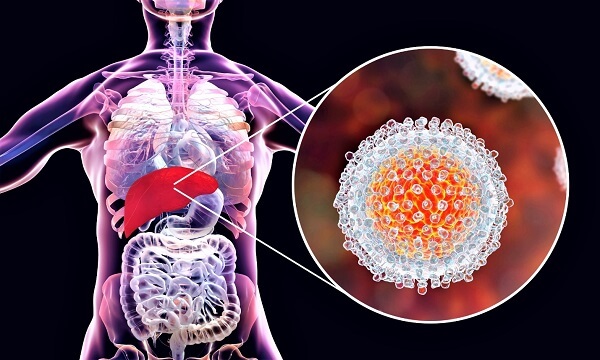Hepatitis DefinitionInflammation of the liver is referred to as hepatitis in medicine. Several factors, including viral infections, alcohol abuse, autoimmune disorders, and exposure to certain drugs and toxins, can cause it. When the liver becomes inflamed, it can become damaged and lose its ability to function properly. Hepatitis can cause fatigue, fever, nausea, abdominal pain, jaundice, and other symptoms. Depending on the underlying cause and severity of the condition, different medications, lifestyle modifications, and occasionally liver transplantation are used to treat hepatitis. The signs and symptoms of hepatitis might vary depending on the underlying cause and the severity of the infection. Some people with hepatitis may not experience any symptoms at all, while others may experience a range of symptoms that can be mild to severe. 
List of Hepatitis Symptoms
It's critical to remember that some types of hepatitis, like hepatitis B and C, can be chronic and may not respond to treatment. Types of Hepatitis1. Acute HepatitisAcute hepatitis is characterized by a fast onset of liver inflammation that usually lasts at least six months. Viral infections, excessive alcohol consumption, using certain drugs, exposure to pollutants, and autoimmune disorders, are just a few of the causes. From a minor, self-limiting infection to a serious, perhaps fatal condition, acute hepatitis can affect anyone. The symptoms of acute hepatitis can include fatigue, nausea, vomiting, loss of appetite, abdominal pain, fever, and jaundice (yellowing of the skin and eyes). In some cases, acute hepatitis may not cause any symptoms at all. The underlying cause and severity of acute hepatitis determine the course of treatment. For example, viral hepatitis may be treated with antiviral medications, while autoimmune hepatitis may require immunosuppressive therapy. Treatment may include supportive measures, including proper nourishment and rest, observing liver function, and managing potential problems. When acute hepatitis is properly treated, most patients fully recover without experiencing any long-term liver damage. 2. Fulminant HepatitisAcute liver failure, or fulminant hepatitis, is a rare but serious condition that develops when the liver suddenly stops working properly. Within days or weeks of the onset of symptoms, it is characterized by rapid liver failure and can cause potentially fatal side effects like brain swelling and bleeding disorders. Viral infections, autoimmune conditions, drug- or toxin-induced liver injury, and metabolic disorders are just a few causes of fulminant hepatitis. In some cases, the cause may not be identified. Acute hepatitis symptoms are like fulminant hepatitis, but the latter's symptoms advance quickly and may also include confusion, coma, and bleeding tendencies. A liver transplant may be essential in severe circumstances to save the patient's life. 3. Chronic HepatitisChronic hepatitis is a long-term inflammation of the liver that lasts for at least six months. Viral infections, excessive alcohol consumption, using certain drugs, exposure to pollutants, and autoimmune disorders, are just a few of the causes. Initially showing no symptoms, chronic hepatitis can slowly worsen over time. However, as the disease progresses, it can lead to serious liver damage, including cirrhosis, liver failure, and liver cancer. Depending on the underlying cause and the degree of liver damage, chronic hepatitis symptoms may include fatigue, abdominal pain, loss of appetite, nausea, and jaundice. In some cases, chronic hepatitis may not cause any symptoms at all. Causes of HepatitisMany things, such as viral infections, excessive alcohol use, contact with specific drugs or toxins, and autoimmune diseases, can lead to hepatitis. Following are some of the most common causes of hepatitis:
Mechanism of HepatitisHepatitis is an inflammation of the liver that several things, such as viral infections, excessive alcohol consumption, drug toxicity, and autoimmune diseases, can bring on. Hepatitis A, B, C, D, and E viruses are the most often causing agents of viral hepatitis. Some viruses could infect liver cells, resulting in liver tissue inflammation and damage. Depending on the particular virus, hepatitis has a different mechanism. But, typically, the virus enters the body, moves to the liver, and then infects hepatocytes, which are liver cells. The virus multiplies inside the hepatocyte, creating new copies of itself. This procedure can potentially harm and destroy diseased hepatocytes, resulting in liver inflammation and scarring. Hepatitis' mechanism also involves the body's immunological reaction to the infection. The immune system sends immune cells to the liver to assault and kill the infected hepatocytes when it discovers the virus is there. Moreover, the inflammation and liver damage caused by this immunological reaction. Several factors, in addition to viral hepatitis, can harm and inflame the liver. For instance, excessive alcohol consumption can harm the liver by having a direct toxic effect on the liver cells. Drugs and poisons can also harm the liver by impairing its functions and killing off its cells. When the immune system erroneously assaults the liver, it can result in autoimmune hepatitis, which can cause inflammation and damage to the liver. Diagnosis of HepatitisHepatitis is diagnosed using a combination of laboratory tests, physical examination, and medical history. The procedures for diagnosing hepatitis are as follows:
The findings of these tests allow the doctor to ascertain the origin and extent of hepatitis and to create a suitable treatment strategy. Virus Screening
Next TopicIntegers Definition Math
|
 For Videos Join Our Youtube Channel: Join Now
For Videos Join Our Youtube Channel: Join Now
Feedback
- Send your Feedback to [email protected]
Help Others, Please Share










